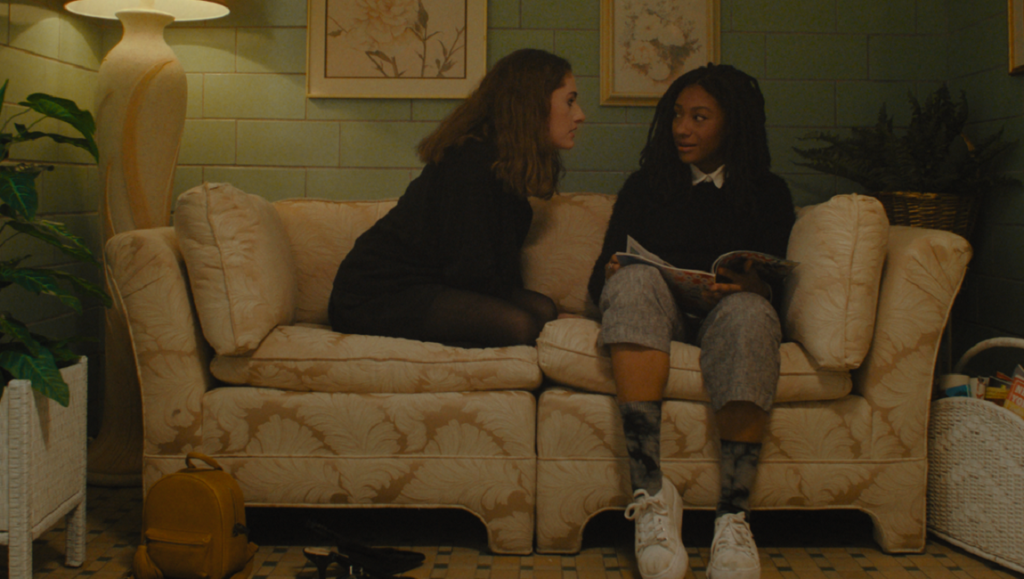Tahara isn’t a subtle film — formally or thematically — but it is an exceptionally executed one, striking a impressive balance between emotional realism and affectation.
Olivia Peace’s debut feature Tahara opens with an adolescent epiphany on perspective — that you may think you’re looking at a square for years, only to find that what you’re actually looking at is one side of a cube. It’s no grand revelation, but it is the sort that might feel earth-shaking the first time you youthfully encounter it, the way most things do in adolescence. In the wake of a classmate’s suicide, Carrie (Madeline Grey DeFreece) and best friend Hannah (Rachel Sennott) are left with a sudden awareness of just how little they know about each other and the world around them, and when a kissing game leads Carrie to realize her own queerness, the sometimes painful process of broadening horizons begins.
That opening image of the square persists, embodied by the film’s square aspect ratio, which is itself a reference to Instagram’s photo format and a constant reminder of the omnipresence of social media. The unnatural visual impact of this viewing window hammers home Peace’s point, its limits not only evoking the performativity of social media, but also daring audiences to consider the margins, what might be happening just outside our narrow frame of vision. It’s not a subtle piece of cinematography, but it’s functionally successful nonetheless, and the rare moments when Peace does widen her frame land with more force in contrast to the rest of the film’s tight constraint. Peace directs Tahara like a child with a toy-box full of cinematographic tricks and visual idiosyncrasies, throwing in on-screen social media usernames for each character, sequences of animation, and even claymation. In any other film, this approach might feel way too try-hard, or at least over-baked, but not only does Peace incorporate all such flourishes effectively, the approach reflects exactly the process of a teenager trying to get a handle on her own identity. Carrie’s opening monologue describes the pain of being inarticulate, of not having the right vocabulary to express yourself when it really matters, and all these visual languages are indicative of that struggle, with the truth breaching the edges of perspective and forcing its way into frame, even if it has to break the strict, narrow realism of the film to do so.
Tahara offers a compelling alternative to relentlessly positive queer teen media, which typically seems to underestimate the teenage capacity for cruelty. Stories like Love, Simon or the recent Heartstopper are admirable for offering queer youth a place of solace, but there can be something fundamentally dishonest in all of that baked-in optimism. Queer coming-out and coming-of-age rarely occur on the same timeline, and those early relationships can be riddled with harm — queer women in particular often share anecdotes of viscerally intense relationships with best friends in their adolescence that often harbored displaced romantic dynamics — and Tahara doesn’t shy away from just how messy these struggles for identity can get. While DeFreece’s performance does most of the emotional heavy-lifting in Tahara, it’s Sennott who gets the more memorable role as Hannah, trudging around in kitten heels and trying to act far older than she is. As Hannah, Sennott makes DeFreece’s Carrie look terse in comparison, constantly opining about boys and (heterosexual) sex to the point that it feels performative, and is full of such bravado and light-hearted bitchiness that her work feels quite magnetic. And at 78 minutes, Tahara doesn’t overstay its welcome, briefly offering a window into a single transformative moment, cementing not only director Olivia Peace as one to watch, but both of the film’s exceptional leads as well.


Comments are closed.